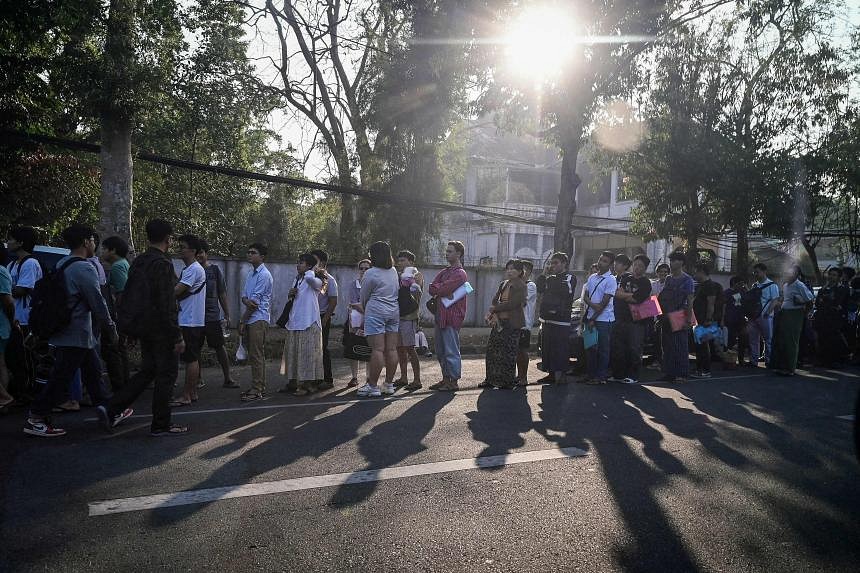YANGON - More than 1,000 people lined up at the Thai embassy in Yangon on Feb 16 as young people sought to leave Myanmar after the junta said it would impose military service.
The military said on Feb 10 that it would enforce a law allowing it to call up all men aged 18 to 35 and women aged 18 to 27 to serve for at least two years as it struggles to quell opposition to its 2021 coup.
The junta faces widespread armed resistance to its rule after seizing power from an elected civilian government, and recently suffered a series of stunning losses to an armed alliance of ethnic minority groups.
The Thai embassy in Yangon has been swamped with young men and women seeking visas to get out of Myanmar since the announcement that the “People’s Military Service Law” would be brought into force.
On Feb 16, an AFP journalist saw a queue of between 1,000 and 2,000 people snaking through the streets near the mission in downtown Yangon – compared with fewer than 100 before the announcement.
The embassy said it was issuing 400 numbered tickets a day in order to manage the queue.
Student Aung Phyo, 20, told AFP he arrived at the embassy at 8pm on the night of Feb 15 and slept in his car before starting to queue around midnight.
“We had to wait for three hours and police opened the security gate around 3am and we had to run to the front of the embassy to try to get places for a token,” said Aung Phyo, who, like others AFP spoke to, used a pseudonym because of fears for his safety.
The law was authored by a previous junta in 2010 but was never used, and it is not clear how it will now be enforced.
No details have been given about how those called up would be expected to serve, but many young people are not keen to wait and find out.
“I will go to Bangkok with a tourist visa and hope to stay there for a while,” Aung Phyo said.
“I haven’t decided yet to work or study. I just wanted to escape from this country.”
Kaung Kaung, 22, said all the hotels near the Thai embassy were fully booked with people trying to get visas, and he started queueing at 2am.
“When the security gate opened, we ran like in a marathon. All I could think of was getting a place in front of the embassy and running as fast as I can,” Kaung Kaung told AFP.
Lost our dreams
The lack of information about the new military service scheme has only fuelled anxiety among those who could be affected.
“When I heard of this military service law, I was shocked,” student War War, 20, told AFP.
“I asked around whether it is true or just a rumour, and when we confirmed it was true, most of us were scared.”
She said many of her friends were now asking about joining anti-coup People’s Defence Force (PDF) groups rather than risk being drawn in to fight for the junta.
“Young people in Myanmar have lost their dreams, and this law hurts them and makes them even more afraid,” she said.
Zaw Myo, 25, agreed that the announcement made the future only look bleaker in a country where the economy is already on the rocks because of the civil war.
“This military service law is another hitting point to destroy the country,” he told AFP.
“Most of the companies, restaurants, businesses are run with young people – if there are no young people in the country, most businesses will shut down.”
Crisis of confidence
Junta spokesman Zaw Min Tun said on Feb 10 that the military service system was needed “because of the situation happening in our country”, as it battles both PDFs and more longstanding armed groups belonging to ethnic minorities.
Around 13 million people will be eligible to be called up, he said, though the military has capacity to train only 50,000 a year.
“It’s difficult for us to give training for even 0.5 per cent of people who are of qualifying age,” Mr Zaw Min Tun said in his statement.
Mr Richard Horsey of the International Crisis Group said the military’s call-up announcement was “a measure of the dire state of the army – facing high casualties, weak recruitment and a crisis of confidence throughout the ranks”.
More than 4,500 people have been killed in the military’s crackdown on dissent since its February 2021 coup and more than 26,000 arrested, according to a local monitoring group. AFP

